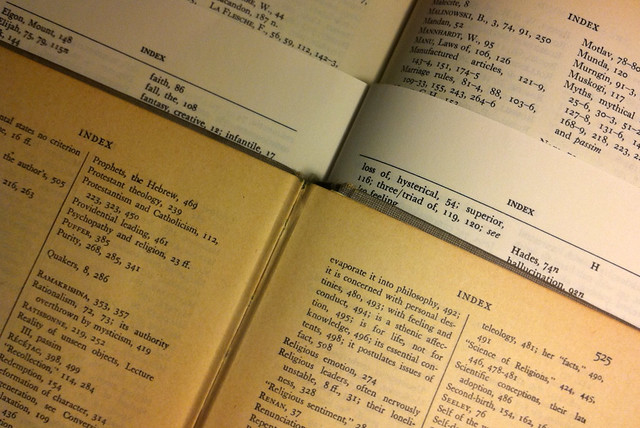I is for Indexes and the Internet
 |
| Index from J E Theriot on Flickr Creative Commons licence is here.
What would we do without indexes? And God bless the folk that create them. I confess to getting a bit cranky these days if I borrow a non-fiction book and it doesn't have an index - what were they thinking? Of course, indexes are not just in the back of books. Researchers can find them in libraries and archives. They might be created by archivists and librarians or volunteers like the members of QFHS and wonderful individuals like Judy Webster. They are fantastic tools or finding aids that help you navigate a sea of information.
I am a bit chuffed because today I received my very own copy of Brian Papardallo's Tracing Your Naval Ancestors.
It contains many tables showing what records exist in The National Archives and if personal name indexes exist for them. Now, if only I could get to them thar Archives!
There are of course other volumes out there that might be able to help. In my search for information about my great-grandfather and what he might be doing in the South China sea in the early 20th Century, I borrowed a book from my local library called The Australian Illustrated Encyclopaedia of the Boxer Uprising 1899-1901 by Justin Corfield. Naval contingents from NSW, Victoria and South Australia went to China. If you think one of your ancestors may have served in this conflict, I would highly recommend you borrow/obtain this book as it has lists/biographies of those who served. I was pleased to find in it a reasonably exhaustive biography of Edward Richard Connor (1848-1903). I keep coming across references to him and he was serving around the same time as my Edward Connor. Maybe he's related, I'm not sure, but at least this book was able to tell me that his parents were Alexander and Naomi Connor - names that are unfamiliar to me.
Another useful book when looking for helpful sites on the internet is Peter Christian's The Genealogist's Internet. Of course, all books featuring websites are bound to date very quickly but at least it is a starting point.
One of the sites he recommended is Paul Benyon's Late 18th, 19th and early 20th Century Naval and Naval Social History site. There is also Paul's Index of 19th Century Naval vessels here. There's a lot of me that wishes the site was sourced better but it's fascinating nevertheless.
Other sites that might be helpful are:
The UK Mariners page on Hall's Website
Gilbert Provost's Register of Ships transcribed from Lloyd's Register of British and Foreign Shipping from 1764 to 2003.
Then there's CLIP or the Crew List Index Project.
Or how about Mariners?
Of course you should also consider browsing gateways like Genuki's Military Records page (scroll to the bottom to find all things Navy) and Cyndislist. And then there's UKMFH - oh dear Lord, I may never get to bed at this rate!
|






Comments
Enjoy that new book and the research. Have a blessed day. :)
One of my pet hates are non-fiction books without indexes.